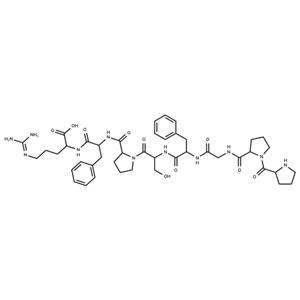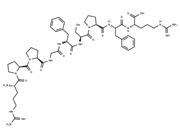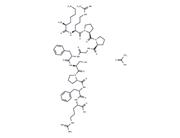| In vitro | The Bradykinin peptide system, crucial for cardiovascular and renal functions, is examined using a highly sensitive amino terminal-directed radioimmunoassay combined with high-performance liquid chromatography. This method allows for the precise measurement of various Bradykinin peptides, including Bradykinin-(1-7), Bradykinin-(1-8), and Bradykinin-(1-9). An additional carboxy terminal-directed radioimmunoassay facilitates the characterization of these peptides in rat kidney and blood. The primary findings indicate that Bradykinin-(1-9) and Bradykinin-(1-7) are the most abundant in the kidney, with significantly lower concentrations of Bradykinin-(1-8) and Bradykinin-(4-9), while Bradykinin-(2-9) and Bradykinin-(3-9) are undetectable. Blood analysis shows very low levels of Bradykinin-(1-9), with other peptides falling below detection thresholds. Administration of the ACE inhibitor Perindopril significantly increases renal levels of Bradykinin-(1-8) and Bradykinin-(1-9), altering the Bradykinin-(1-7)/Bradykinin-(1-9) ratio. This radioimmunoassay approach is also effectively applied to heart, aorta, brown adipose tissue, adrenal, lung, and brain tissues, identifying similar abundance levels of Bradykinin-(1-7) and Bradykinin-(1-9), with Bradykinin-(1-8) present in lower amounts. |

 United States
United States



